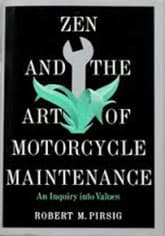Zen and the Art of Motorcycle Maintenance
Critique • Quotes
 First edition
First editionSubtitle
An Inquiry into Values
First publication
1974
Literature form
Novel
Genres
Literary, philosophical
Writing language
English
Author's country
United States
Length
Approx. 175,000 words
Strangest bestseller
Two kinds of people are apt to hate Zen and the Art of Motorcycle Maintenance: advanced philosophy majors and advanced novel readers.
As a novel, Zen is terrible. Virtually no narrative, cardboard characters, and generally incompetent writing. But, as the reader very quickly discovers, this really isn't meant to be a piece of fiction in the usual sense. Rather the novel form is used as a platform to present philosophical ideas. Going back perhaps to before the novel form, say to Plato presenting his arguments to the wider public through dialogues.
Except Robert Pirsig's argument in Zen is almost exclusively with himself. In every chapter the central character (himself) stops the story of his motorcycle trip through the American Midwest with his son, usually after only a page or so, to soliloquize at great length about how he developed his philosophy of "Quality".
There is some story potential in the introduction of a mysterious character Phaedrus, whose memory arises in the narrator's mind, but this turns out to be nothing more than Pirsig himself again—in a persona he had taken on before a mental breakdown some years earlier. (Phaedrus, by the way is also the title of a Platonic dialogue, named for a character engaging Socrates in argument.)
Then even the dramatic possibilities of this—a suppressed personality trying to take over the new "cured" one? a schizophrenic coming to terms with reality?—are spent. It becomes apparent Phaedrus is resurrected in the story only as a mouthpiece for Pirsig's philosophical views.
Strange fancy
Every now and then in book publishing history, a "novel" thin on literary values but heavy on a seemingly new message—usually of a heart-warming, stop-and-smell-the-roses nature—captures the public's fancy in a big way. A particularly lightweight example from the same era is 1970's Jonathan Livingston Seagull.
But Zen and the Art of Motorcycle Maintenance, subtitled An Inquiry into Values, is a strange bestseller in this category. For the thought presented by Pirsig/Phaedrus is actually rather heavy-duty. It's the kind of material you might actually study in undergraduate philosophy classes. In fact, the novel has become required reading in some undergraduate university programs. Several chapters of Zen do little more than gloss the views of ancient Greeks and early modern philosophers like Hume and Kant.
This in itself is not a bad thing. At one time, the novel form was thought to bring together all aspects of writing, incorporating broader, complex ideas into creative writing in a way that short stories and poetry could not. Zen may represent a return to that ideal. The trouble though is that Pirsig goes on to present himself as having solved all the major philosophical questions raised through his discovery of Quality as a kind of indefinable source of all ideas and things. Worse, the arguments he presents for this theory-of-everything are so weak they could be seen through by those same undergrads by the time they get to their sophomore or junior year.
In the end, recognizing the contradictions into which he falls, Pirsig retreats into mysticism, declaiming the truth of his supposed discoveries regardless of their failures.
His long-awaited sequel Lila: An Inquiry into Morals (1991), which supposedly reorganizes the material into a more methodical "Metaphysics of Quality", suffers the same weakness.
Nonetheless, countless readers claim to have found life-changing insight in Zen and the Art of Motorcycle Maintenance. I suspect they are reading their own insights into this confused book. Which, admittedly, sounds like something Pirsig would say.
— Eric
Critique • Quotes

